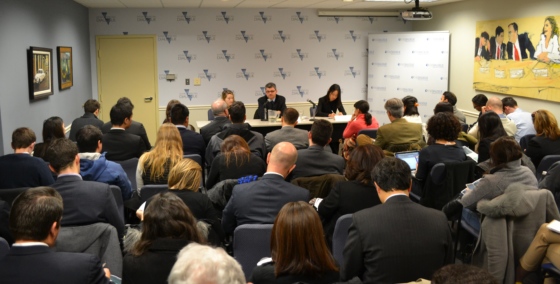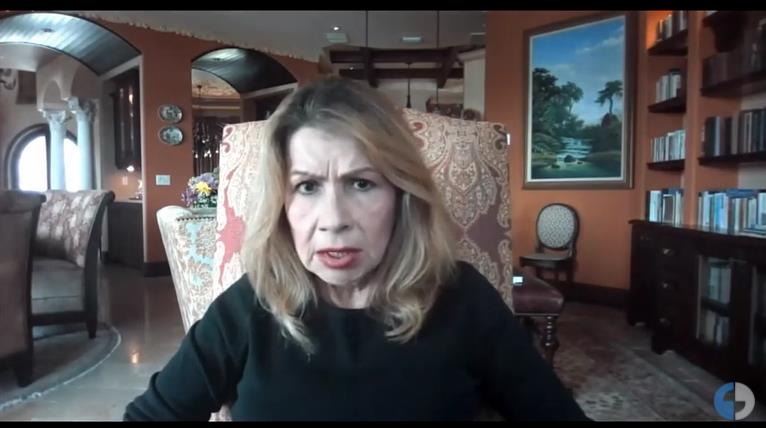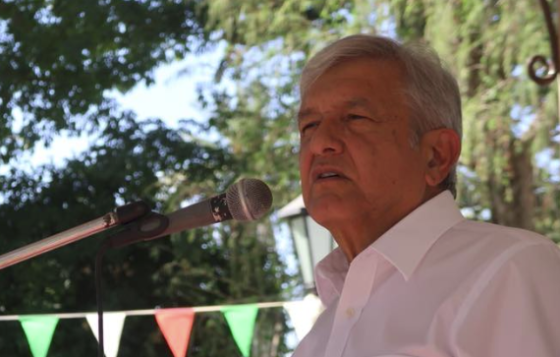
Interpreting Chinese Finance to LAC
Despite slowing growth on both sides of the Pacific, China’s policy bank finance to Latin America reached $30 billion in 2015.
A Daily Publication of The Dialogue
World Bank Chief Economist Carmen Reinhart warned this month of Latin America’s increasing potential to fall into insolvency after taking on unprecedented levels of debt during the coronavirus pandemic. The region’s banks, many of which have offered borrowers grace periods, are uncertain how many small businesses and households will be able to repay their debts, she said. How deeply are Latin America and the Caribbean nations in debt, and which countries and sectors face the highest risk of insolvency? How will access to and the cost of credit for the region change in the years ahead? How can policymakers prepare for a more organized restructuring of massive debt loads, and could global frameworks and international resources do a better job of addressing the problem than in past debt restructurings in countries such as Argentina, Ecuador and Venezuela?
Adam Boehler, chief executive of the U.S. International Development Finance Corporation (DFC): “When DFC launched late last year as America’s development bank, we could not have foreseen how this new U.S. government agency would be called upon to respond to a global crisis that threatens livelihoods and developing world economies. As stay-at-home orders and limited border crossings made it difficult for businesses to operate, we responded quickly to inject liquidity into markets where private financing was constrained. In recent months, DFC launched a $4 billion rapid response liquidity facility to provide additional support to projects affected by the pandemic, and we approved multiple projects to support lending to SMEs throughout Latin America. Financing of up to $150 million will help Ecuador’s Banco Pichincha expand lending to women-owned and -led micro, small and medium enterprises, addressing a major barrier to credit facing the country’s women, who have been disproportionately affected by the economic challenges of Covid-19. The pandemic has resulted in an unprecedented crisis, exacerbating the struggle developing countries often have with insufficient access to credit. DFC’s core mission is to work to mobilize capital to advance stability and prosperity. We have more than $8.5 billion invested in Latin America, which represents the largest share of our global portfolio, and we support multiple projects to increase liquidity across the region. In Guatemala, we approved a $200 million loan to Banco Industrial to support lending to SMEs, particularly those owned by women and rural borrowers. In El Salvador, we approved a $10 million loan to expand access to affordable mortgages. Investment will be essential to a sustained economic recovery, and DFC’s swift response is mobilizing investment to the communities that need it most.”
Ernesto Revilla, managing director and head of Latin American economics at Citigroup: “In addition to the grief of the many lives lost, the main legacy of this crisis for all countries will be high levels of debt and difficult politics. Debt increased everywhere. The IMF had estimated that debt in advanced economies would increase by 9 percent of GDP on average and in emerging markets by 12 percent of GDP. With a long pandemic, it might be worse. These significant deteriorations in fiscal positions were necessary to prevent bigger downturns in economic activity, job losses and failing firms. However, how to deal with the debt will be a central economic question of the next decade. This crisis will also leave a very complicated political terrain to navigate. Again, this is not exclusive to the emerging world—witness the road to the U.S. presidential election. In Latin America, social unrest and protests were unsettling the region in the end of 2019. Add to the mix that created the unrest a dramatic health crisis and an economic shock that has deepened inequalities, and we have a fragile environment for debt repayment. The debt explosion and complicated politics interact in distressing ways. To deal with the debt, Latin American countries would need a combination of growth, tax reforms and reduced spending. All of these become much more complicated without popular support. Unfortunately, there are increasing odds that barring those solutions, old Latin American evils will return. Financial repression, monetary financing of deficits and complicated restructurings of debt might be in the menu for many countries in the 2020s.”
Joydeep Mukherji, managing director of Latin American sovereign ratings at Standard & Poor’s in New York: “Sovereign debt will increase by a record amount in 2020, but the willingness and ability of sovereigns to service their debt on time and in full depends more on their monetary flexibility and economic resilience than on their government debt-to-GDP ratios. Most of the debt increase will happen in a small number of investment grade sovereigns (Chile, Peru, Colombia, Mexico) or in others with substantial domestic capital markets (Brazil), limiting the risk of default. Moreover, debt servicing may rise less than the debt burden, due to likely low interest rates. Many countries have improved their debt profile in recent years, making it less vulnerable to spikes in interest rates or the exchange rate. Nevertheless, many sovereigns (Uruguay, Paraguay, Nicaragua, Jamaica, Honduras, Guatemala, Dominican Republic, Costa Rica and Bolivia) still have more than 40 percent of their debt in foreign currencies, highlighting vulnerability to sudden changes in the exchange rate. We have lowered proportionately more ratings in this region than in the world as a whole since the outbreak of the pandemic, demonstrating the comparatively bigger impact of the global downturn in Latin America. However, the recent sovereign defaults in the region have not all been caused by the pandemic. Both Venezuela and Argentina had defaulted before the outbreak of the pandemic, and Ecuador and Suriname had very low ratings prior to the pandemic. These defaults happened in countries with a history of prior sovereign defaults. While more generous debt relief and greater official lending would help, the real challenges lie in domestic politics and policies.”
Alicia Bárcena, member of the Inter-American Dialogue and executive secretary of the United Nations Economic Commission for Latin America and the Caribbean (ECLAC): “ECLAC estimates that central government debt in Latin America will increase by 9.3 percentage points of gross domestic product this year to reach 55.3 percent of GDP, the highest level in the last 20 years, although still below that of developed countries. The problem is much more acute for the Caribbean, where central government debt stands at almost 70 percent of GDP with several countries posting ratios around or above 100 percent of GDP even before the Covid-19 pandemic. Despite rising debt levels, in the medium-term, fiscal policy must remain expansionary to provide a solid base for economic recovery and for building better societies after the Covid-19 crisis; now is not time for fiscal austerity. Making expansionary fiscal policy sustainable going forward requires expanding fiscal space by bolstering tax revenues. The region’s tax take is low (23.1 percent of GDP compared to 34.3 percent of GDP for OECD countries) and is skewed toward regressive indirect taxation. Tax evasion is endemic; ECLAC estimates that in 2018 Latin America lost $325 billion in revenues, or 6.1 percent of GDP, to tax noncompliance and $85 billion—or 1.6 percent of regional GDP—in illicit financial flows as a result of trade misinvoicing. Beyond bolstering tax revenues, there is a role for international cooperation to provide greater policy space. The international community must address the most urgent debt problems through suspensions on debt repayments and debt relief. ECLAC’s proposal for debt relief and the creation of a resilience fund for the Caribbean would address debt issues.”
 The Latin America Advisor features Q&A from leaders in politics, economics, and finance every business day. It is available to members of the Dialogue’s Corporate Program and others by subscription.
The Latin America Advisor features Q&A from leaders in politics, economics, and finance every business day. It is available to members of the Dialogue’s Corporate Program and others by subscription.
Despite slowing growth on both sides of the Pacific, China’s policy bank finance to Latin America reached $30 billion in 2015.
Iván Duque, a conservative former senator, on Sunday won Colombia’s presidential runoff election. What does it mean for the country?
Mexicans go to the polls on Sunday, July 1, for the country’s presidential, legislative and local elections. What can we expect?
 World Bank Chief Economist Carmen Reinhart said this month that Latin America is too dependent upon external finance. // File Photo: Inter-American Dialogue.
World Bank Chief Economist Carmen Reinhart said this month that Latin America is too dependent upon external finance. // File Photo: Inter-American Dialogue.

